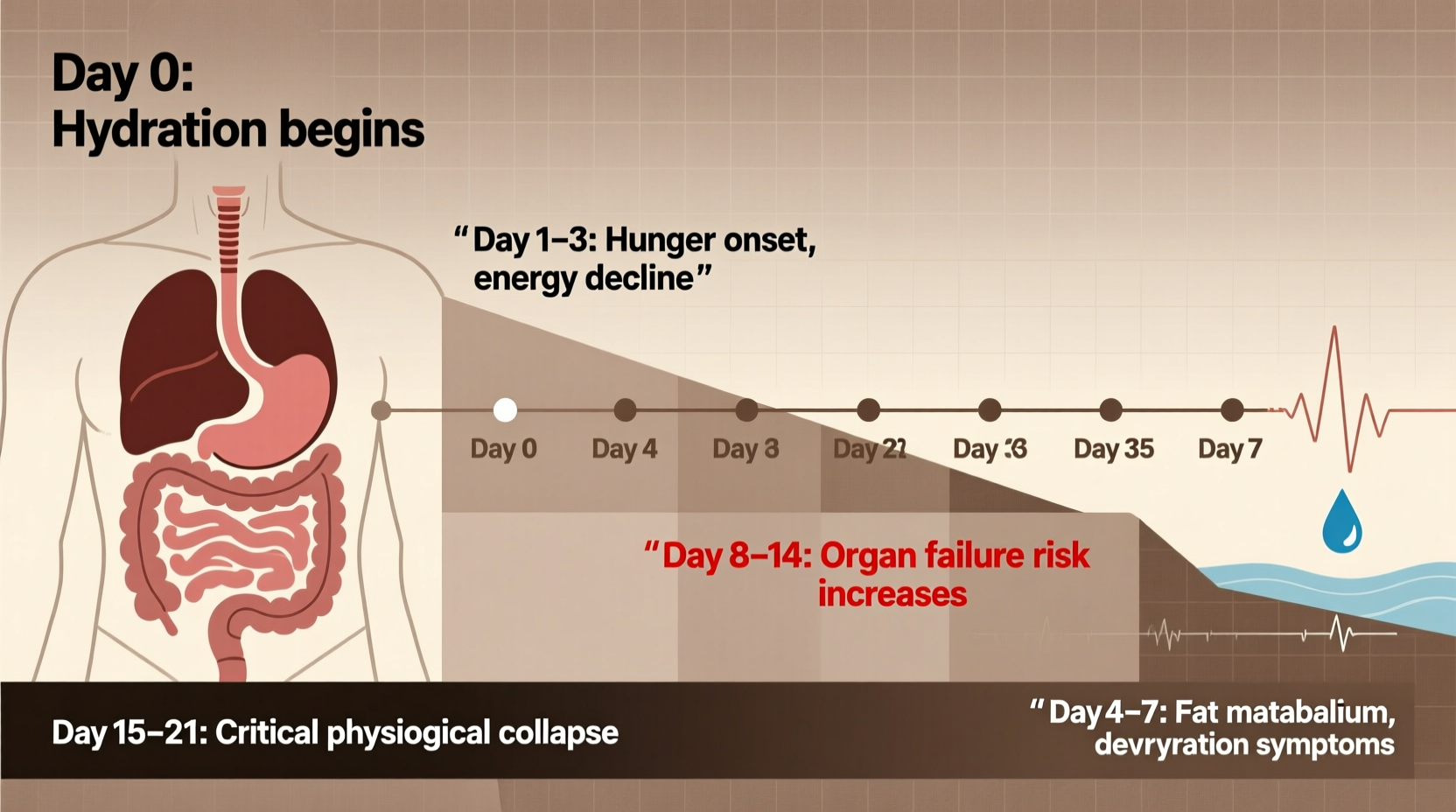Understanding Human Survival Limits: Food vs. Water
When discussing survival without basic necessities, it's crucial to understand why water matters more immediately than food. Your body comprises about 60% water, and losing just 2% of your total body water triggers dehydration symptoms. Unlike food stores, your body has no water reserves—it must be continuously replenished.
What Happens During Water Deprivation
Dehydration progresses rapidly through distinct physiological stages. Within hours of water restriction, your body initiates conservation mechanisms that affect cognitive and physical performance long before reaching critical stages.
| Timeframe | Physiological Changes | Symptoms |
|---|---|---|
| 24 hours | Body reduces urine output by 60% | Mild thirst, reduced concentration |
| 48 hours | Blood volume decreases 10-15% | Dry mouth, headache, dizziness |
| 72 hours | Kidney function declines significantly | Confusion, rapid heartbeat, minimal urine |
| 96+ hours | Organ failure begins | Loss of consciousness, coma, death |
Factors That Extend or Shorten Survival Time
Survival duration varies significantly based on multiple factors. Medical research from the CDC shows environmental conditions dramatically impact dehydration rates. In 100°F (38°C) heat, survival without water may drop to 24-48 hours compared to 3-4 days in cooler conditions.
- Body composition: Higher body fat percentage extends food survival (fat stores energy) but doesn't significantly affect water needs
- Health status: Pre-existing conditions like diabetes accelerate dehydration
- Activity level: Physical exertion increases water requirements by 50-100%
- Acclimatization: People adapted to arid environments process water more efficiently
Starvation Timeline: What Science Reveals
Unlike water deprivation, starvation follows a more gradual progression as the body switches energy sources. The landmark Minnesota Starvation Experiment (1944-1945) documented how healthy men survived 6 months with severely restricted calories while maintaining hydration. Modern medical understanding from Harvard Medical School confirms several metabolic phases:
- 0-24 hours: Body uses glycogen stores from liver and muscles
- Day 2-3: Metabolism shifts to fat stores through ketosis
- Week 2-3: Protein breakdown begins as last energy source
- Week 4+: Organ deterioration accelerates without intervention
Documented Survival Cases and Medical Evidence
Real-world cases provide valuable data points for survival limits. The longest medically documented survival without food (with water) is 74 days by Angus Barbieri in 1965 under medical supervision. However, these exceptional cases shouldn't be considered typical.
Emergency medicine specialists at the Mayo Clinic emphasize that individual variation makes precise predictions impossible. Their clinical observations show:
- Water survival rarely exceeds 4 days outside controlled medical environments
- Food survival beyond 60 days typically requires exceptional circumstances
- Children and elderly face significantly shorter survival windows
Recognizing Critical Warning Signs
Knowing the progression of symptoms can help identify when intervention becomes urgent. The American College of Emergency Physicians identifies these critical markers requiring immediate medical attention:
- No urine output for 12+ hours (severe dehydration)
- Inability to keep eyes open or focus (advanced dehydration)
- Cold, clammy skin with weak pulse (circulatory collapse)
- Confusion or disorientation (neurological impairment)
If you or someone else shows these symptoms after prolonged lack of food or water, seek emergency medical care immediately. Delaying treatment beyond these stages significantly reduces recovery chances.
Practical Survival Guidelines
While understanding theoretical limits is valuable, practical knowledge saves lives. Emergency preparedness experts recommend:
- Store at least one gallon of water per person per day for emergency kits
- Include electrolyte solutions in survival supplies to extend hydration effectiveness
- Consume high-fat foods first during food shortages to preserve protein stores
- Reduce physical activity to conserve water and energy during emergencies











 浙公网安备
33010002000092号
浙公网安备
33010002000092号 浙B2-20120091-4
浙B2-20120091-4